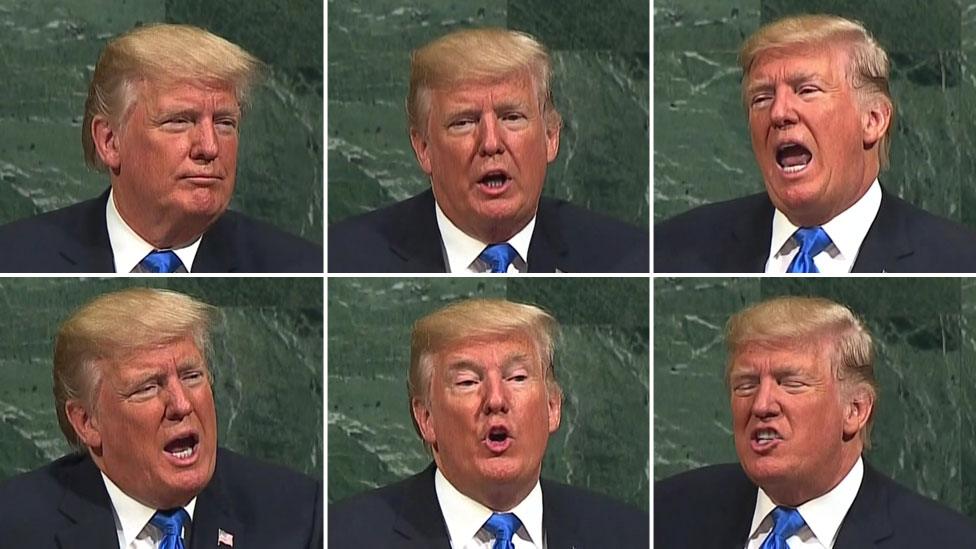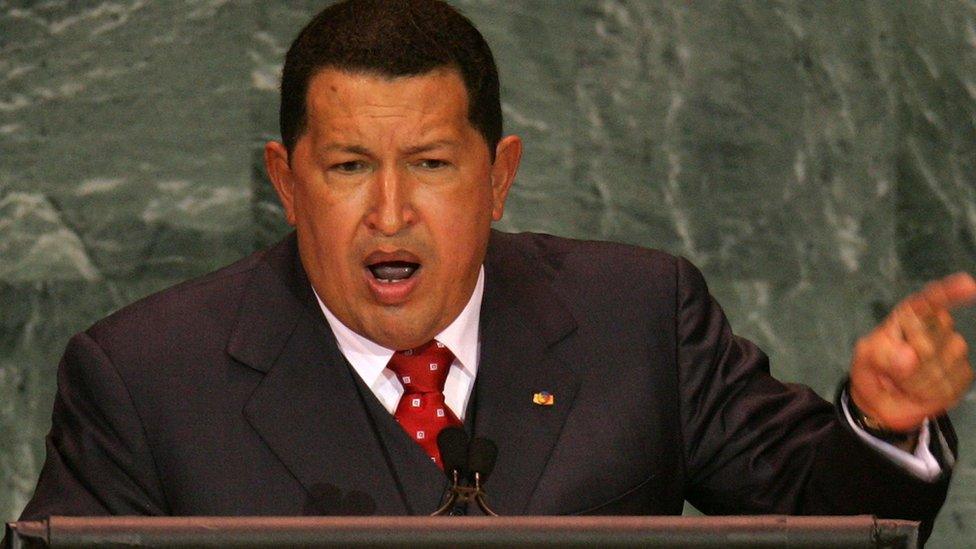Trump UN speech: Why his rhetoric was a game-changer
- Published
Which 'rogue states' are in Trump's new axis of evil?
President Donald Trump's 'Rocket Man' speech at the UN could well be unprecedented or, at the least, will become one of the most memorable of its General Assembly moments.
Warning Pyongyang to back down from its nuclear challenge, Donald Trump threatened to eliminate a UN member state. And he underlined the extraordinary statement with his derogatory Twitter nickname for the North Korean leader Kim Jong-un.
"If [the United States] is forced to defend itself or its allies, we will have no choice but to totally destroy North Korea," he told world leaders, causing a stir in the hallowed hall of diplomacy.
"Rocket Man is on a suicide mission for himself and for his regime."
I cannot recall language from any world leader at the UN podium that comes even close.
Theatrics yes: Libya's Colonel Muammar Qaddafi tearing out pages from the UN Charter as he spoke. Venezuela's Hugo Chavez sniffing the "smell of sulphur" left behind by George W Bush.
But to speak of wiping out a country of 25 million people? No.
Trump's UN audience agrees on one thing about his speech
UN members had been waiting with some anxiety to hear what the new US president would say, a stark contrast to the anticipation I remember infusing the staid institution for the first speech of his predecessor, Barack Obama.
President Trump didn't attack the organisation itself, as many feared he would after his scathing critique of the UN as an incompetent club for elites.
In fact he seemed to accept it has a role to play in his vision of the world order, despite the widespread impression here that he's isolationist and unilateralist.
But he reinforced concerns about his war rhetoric on North Korea, and fears that he'll rip up the nuclear deal limiting Iran's nuclear programme.
Mr Trump called the agreement "an embarrassment to the US" and denounced Tehran as an "economically depleted rogue state" that exports violence.
Trump: 'Rocket Man's suicide mission'
Under US law the president has to recertify to Congress every 90 days that Iran is complying with the deal, and that it serves America's national security interests.
President Trump's been hinting he might not do so when the next deadline comes up in mid-October.
That would trigger a congressional process which could unravel the accord.
'Fiery talk, fatal misunderstandings'
Mr Trump was clearly speaking to his "America First" constituency - he started by giving the usual shout-out to economic achievements since his election.
For his international audience he couched his America First policy in the language of national sovereignty embedded in the UN's founding principles, one regularly cited by powerful Security Council members China and Russia.
In essence he said every nation should put the interests of its own people first. On that basis they could co-operate to counter the most pressing global issues rather than let global institutions and bureaucracies set the agenda.

This tension between a foreign policy driven by national interest rather than universal values and ideals is at the heart of an ongoing debate in the US foreign policy establishment.
But it rarely means a retreat from internationalism such as the president's withdrawal from the Paris Climate Accord.
Nor is it expressed in Mr Trump's transactional terms: for the New York businessman it is all about ending bad deals for America and getting better ones.
Just what sort of deal on North Korea he can get with apocalyptic threats was not illuminated by his speech.
UN members were left to wonder how Pyongyang might be enticed or forced to the negotiating table with Mr Trump disparaging the nuclear détente agreed with Iran.

Was Trump speech a more memorable one than the theatrics of Hugo Chavez?
Or whether the president was mostly trying to leverage greater UN support for stringent sanctions, employing the "with us or against us" language of the Bush administration's Axis of Evil.
"The United States is ready, willing and able (to take military action) but hopefully this will not be necessary," he said. "That's what the United Nations is all about; that's what the United Nations is for. Let's see how they do."
It may very well be that his cabinet secretaries pursuing a diplomatic strategy have the upper hand.
But without channels of communication the North Koreans have no way to interpret the president's astounding escalation in rhetoric.
"When tensions rise, so does the chance of miscalculation," the Secretary General Antonio Guterres said in prescient remarks ahead of President Trump's UN debut: "Fiery talk can lead to fatal misunderstandings."